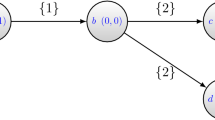Abstract
This article examines the structure of pure strategy coalition-proof Nash equilibria under weak and strong Pareto dominance in games with strategic complementarities and isotone externalities. The analysis is particularly focused on the following issues: (i) the inclusion relation between the set of coalition-proof Nash equilibria under weak Pareto dominance and the set of coalition-proof Nash equilibria under strong Pareto dominance; (ii) the conditions for the coincidence of the strong (resp. weak) Pareto dominance refinement and the coalition-proofness refinement under strong (resp. weak) Pareto dominance; (iii) the conditions for the uniqueness of a coalition-proof Nash equilibrium under both notions of Pareto dominance. Dual results are stated for games with antitone externalities.
Similar content being viewed by others
References
Agliardi E (2000) A generalization of supermodularity. Econ Lett 68: 251–254
Bernheim BD, Peleg B, Whinston MD (1987) Coalition-proof Nash equilibria. I. Concepts. J Econ Theory 42: 1–12
de Frutos MA (1998) Decreasing serial cost sharing under economies of scale. J Econ Theory 79: 245–275
Dubey P, Haimanko O, Zapechelnyuk A (2006) Strategic complements and substitutes, and potential games. Games Econ Behav 54: 77–94
Echenique F (2005) A short and constructive proof of Tarski’s fixed point theorem. Int J Game Theory 33: 215–218
Furusawa T, Konishi H (2011) Contributing or free-riding? Voluntary participation in a public good economy. Theor Econ 6: 219–256
Gierz G, Hofmann KH, Keimel K, Lawson JD, Mislove M, Scott DS (2003) Continuous lattices and domains, Encyclopedia of mathematics and its applications, vol 93. Cambridge University Press, Cambridge
Konishi H, Le Breton M, Weber S (1999) On coalition-proof Nash equilibria in common agency games. J Econ Theory 85: 122–139
Kukushkin NS (2009) On the monotonicity of an optimal choice with respect to a parameter. Dokl Math 79: 296–300
Kukushkin NS, Takahashi S, Yamamori T (2005) Improvement dynamics in games with strategic complementarities. Int J Game Theory 33: 229–238
Milgrom P, Roberts J (1990) Rationalizability, learning and equilibrium in games with strategic complementarities. Econometrica 58: 1255–1277
Milgrom P, Roberts J (1996) Coalition-proofness and correlation with arbitrary communication possibilities. Games Econ Behav 17: 113–128
Milgrom P, Shannon C (1994) Monotone comparative statics. Econometrica 62: 157–180
Moulin H (1996) Cost sharing under increasing returns: a comparison of simple mechanisms. Games Econ Behav 13: 225–251
Shinohara R (2005) Coalition-proofness and dominance relations. Econ Lett 89: 174–179
Shinohara R (2010a) Coalition-proof equilibria in a voluntary participation game. Int J Game Theory 39: 603–615
Shinohara R (2010b) Coalition-proof Nash Equilibrium of aggregative games. Shinshu University discussion papers
Tarski A (1955) A lattice theoretical fixpoint theorem and its applications. Pac J Math 5: 285–309
Thoron S (1998) Formation of a coalition-proof stable cartel. Can J Econ 31: 63–76
Topkis DM (1998) Supermodularity and complementarity. Princeton University Press, Princeton
Vives X (1990) Nash equilibrium with strategic complementarities. J Math Econ 19: 305–321
Vives X (2005) Complementarities and games: new developments. J Econ Lit 43: 437–479
Yi S (1999) On the coalition-proofness of the Pareto frontier of the set of Nash equilibria. Games Econ Behav 26: 353–364
Author information
Authors and Affiliations
Corresponding author
Rights and permissions
About this article
Cite this article
Quartieri, F. Coalition-proofness under weak and strong Pareto dominance. Soc Choice Welf 40, 553–579 (2013). https://doi.org/10.1007/s00355-011-0618-2
Received:
Accepted:
Published:
Issue Date:
DOI: https://doi.org/10.1007/s00355-011-0618-2



